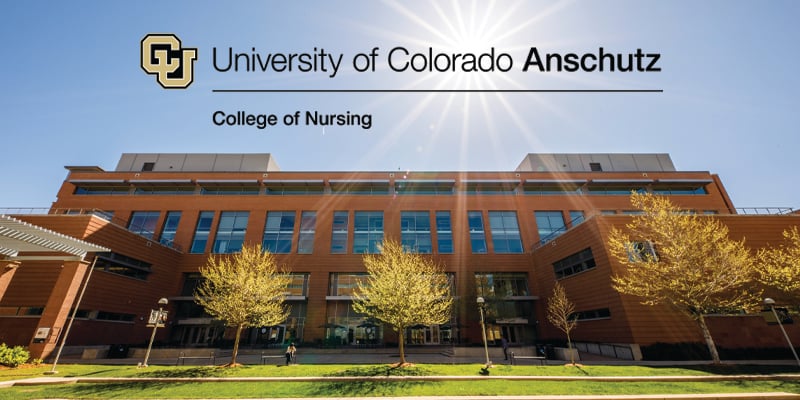When Sue Mower was cleaning out her cousin’s room at an assisted living facility where she lived prior to her death, she opened a kitchen cupboard and saw rows and rows of tiny disposable paper cups used to dispense medications. “I had to smile. It was a curious habit, but typical Evelyn,” said Mower. As a child of the Great Depression, University of Colorado School of Nursing graduate Evelyn Lutz (MS ’65) was not wasteful.
A Child of the Great Depression
Born in 1934, when frugality meant survival, Lutz lived under the shadow of the depression her entire life. Those years shaped a generation. Her generation. “She never really had much growing up. She always said, ‘We had what we needed, and never wanted for anything,’” said Mower. Like many others during that time, the Lutz’s scraped by – learning numerous lessons of frugality that stayed with them throughout their lives. Her family owned a meat market in Elmira, NY, where Lutz would help out when needed. Working during high school helped her save money to pursue a career in nursing at a hospital school where she earned her diploma, which set the stage for a PhD. According to Mower, “It was the only education she could afford since her parents did not have the money.”
Frugality Was a Cornerstone of Lutz’ Life
Accumulating a fortune by being thrifty and frugal, Lutz wasn’t flashy and didn’t show the trappings of wealth. “You really wouldn’t know she had money, because she lived like a normal person,” said Mower. She took home leftovers – hers and everyone else’s with whom she dined. According to Travis Leiker, her philanthropic advisor at CU Anschutz, “Evie was a treasure. I’d make my annual visit to Elmira and we’d either go to a local bar, seriously, for a sandwich or chicken strips, but she especially enjoyed breakfast at Denny’s. During my last breakfast with her, I didn’t finish my pancakes, so she took them home with her!”
She knew that wealth could be fleeting. “And cherished relationships, her family, students she taught, and the education she received over the money she accumulated,” said Mower.
Self-deprecating, independent, and opinionated, “She led such an interesting life. She was extremely private and didn’t like to be celebrated or recognized,” said Mower. As a nurse and college professor, she wrote books and became a trusted mentor to her students and employees. According to Judy Jerkich who worked for Lutz as a student worker in 1969 and then as her secretary in the 1980s, “She was very dedicated. She lived her convictions and cared about her work and the students she worked with.”
Mower and Lutz were second cousins and years apart in age. “Growing up, I never knew her as she left town before I was born,” said Mower. In 2010, when Lutz moved back to Elmira to be around family, the two “just clicked.” Eventually, Mower became her caregiver when she was diagnosed with small cell lung cancer in 2018.
Independent and going strong until COVID-19
At 85, Lutz was still living on her own, exercising three times a week, and volunteering until her cancer metastasized to her brain, motivating her to move into an assisted living facility in March of 2020. Within seven months of her move, she was hospitalized with pneumonia and COVID-19 and passed away on November 21. “It was heartbreaking,” said Mower. Because of the pandemic, visitors were not allowed in the hospital. However, because Lutz had been placed in palliative care, Mower was able to visit her cousin and spend some private time with her.
Lutz Amassed a Fortune and Abundant Gratitude; She Knew the Value of Giving Back
By the time she died, Lutz had squirreled away millions of dollars, which she donated to the University of Rochester, Case Western, and the University of Colorado. She graduated from the University of Rochester in 1955 with a diploma in Nursing, followed by a B.S. in 1963. Then an M.S. degree in 1965 from the University of Colorado, where she met Dr. Loretta Ford, the famed architect behind the Nurse Practitioner program. Then she attained her PhD in 1980 from Case Western Reserve University. “She wanted to give something back to the universities for all they did for her. She said that someone was always helping her to get to the next level. Her alma maters became her support and substitute family,” said Mower.
| The 7 Factors Of A Typical Millionaire |
The Millionaire Next Door: The Surprising Secrets of America’s Wealthy by Thomas Stanley and William Danko uncovers common qualities of the rich.
|
Each institution shaped her career and provided the tools she needed to deliver kind, highly-skilled, and compassionate care. She was the nurse you hope to have at patient’s bedside or checking vitals in the clinic. And while she advanced in her career, she never lost sight of her own gratitude nor the capacity she had to help others as they would pursue their calling in nursing. “Evie knew the role she could have in shaping the future of nursing and CU, and her legacy gift is a testament to this influence and will live on in perpetuity,” said Leiker.
Lutz Epitomized “The Millionaire Next Door”
Like many everyday millionaires, Lutz could be the poster child for the 1996 bestseller The Millionaire Next Door: The Surprising Secrets of America’s Wealthy by Thomas Stanley and William Danko, who found that millionaires are disproportionately represented in middle-class and blue-collar neighborhoods and not in more affluent communities. According to Stanley and Danko, “Three words epitomize the affluent: frugal, frugal, frugal. Being frugal is the cornerstone of wealth-building. And too many Americans live their lives spending tomorrow’s money.” Lutz didn’t need much and saved to help others who could benefit from her generosity. “She always said that her education did not cost her much because she used tuition benefits and CU gave her a federal grant,” said Mower. Her donation of more than $1 million to CU Nursing will support the Loretta Ford Fellowship Endowment Fund, which she selected because she was very impressed by Dr. Ford and followed her career throughout her life. “Evie was an exceptional woman. Even though she was able to save millions of dollars throughout her lifetime, alumni from diverse background should never underestimate the power and impact they can have through philanthropy,” added Leiker.



